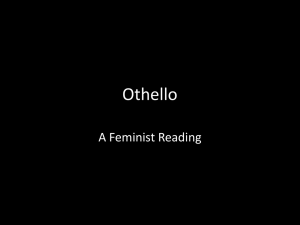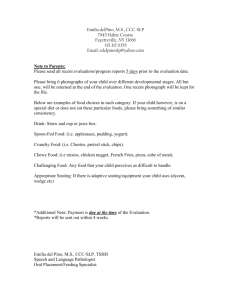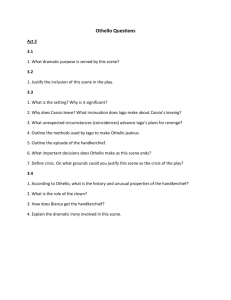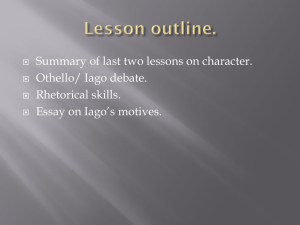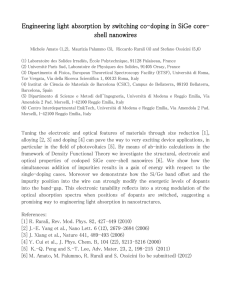The Role of Emilia in Othello
advertisement
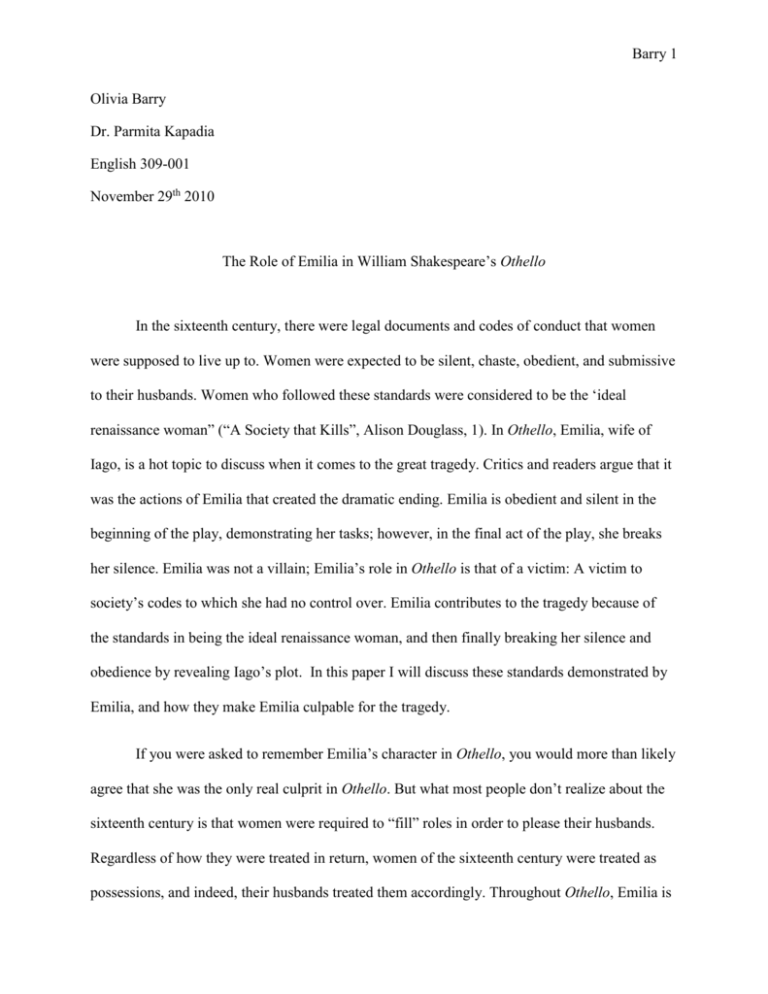
Barry 1 Olivia Barry Dr. Parmita Kapadia English 309-001 November 29th 2010 The Role of Emilia in William Shakespeare’s Othello In the sixteenth century, there were legal documents and codes of conduct that women were supposed to live up to. Women were expected to be silent, chaste, obedient, and submissive to their husbands. Women who followed these standards were considered to be the ‘ideal renaissance woman” (“A Society that Kills”, Alison Douglass, 1). In Othello, Emilia, wife of Iago, is a hot topic to discuss when it comes to the great tragedy. Critics and readers argue that it was the actions of Emilia that created the dramatic ending. Emilia is obedient and silent in the beginning of the play, demonstrating her tasks; however, in the final act of the play, she breaks her silence. Emilia was not a villain; Emilia’s role in Othello is that of a victim: A victim to society’s codes to which she had no control over. Emilia contributes to the tragedy because of the standards in being the ideal renaissance woman, and then finally breaking her silence and obedience by revealing Iago’s plot. In this paper I will discuss these standards demonstrated by Emilia, and how they make Emilia culpable for the tragedy. If you were asked to remember Emilia’s character in Othello, you would more than likely agree that she was the only real culprit in Othello. But what most people don’t realize about the sixteenth century is that women were required to “fill” roles in order to please their husbands. Regardless of how they were treated in return, women of the sixteenth century were treated as possessions, and indeed, their husbands treated them accordingly. Throughout Othello, Emilia is Barry 2 seen as an innocent little wife. She caters to her ungrateful husband, who in return, shows absolutely no reciprocation to her. Emilia is so oblivious to Iago’s attitude towards her, but she continues to follow his orders. In act three, scene three, Desdemona is trying to comfort Othello with the handkerchief that was given to her from him. As they both exit, the handkerchief falls to the ground, unnoticed. Emilia, who is still in the room, steals it for Iago. Most people reading Othello would argue that this is what makes Emilia so culpable for the tragedy. Did Emilia steal the napkin to intentionally betray Desdemona, or was she stealing the napkin because she had to obey Iago? “…My wayward husband hath a hundred times/ wooed me to steal it” (3.3.336-37). Emilia wasn’t thinking about Desdemona when she stole her handkerchief, she was only thinking about Iago. Emilia states that her only purpose as a woman is to please Iago’s fantasy. Emilia knows that one of her roles as a renaissance woman is to obey him and keep him happy. The conversation following the snatching of the napkin shows how little Emilia means to Iago. Emilia, who is happy that she might finally be appreciated for once by Iago, is only ignored and called harsh words. Upon Emilia telling Iago that she has a “thing” for him, Iago does not realize that the “thing” Emilia has for him is the napkin. Iago’s first response is that it is common for a man to have a foolish wife (3.3.348). It’s as though we can actually picture poor Emilia dangling the handkerchief in front of Iago’s eyes in exchange for some token of appreciation. No. Instead Iago commands her to give him the handkerchief after calling her a “good wench” (3.3.359). Emilia asks Iago what he will do the napkin as it was such a huge task to complete. Instead of answering Emilia, Iago snatches the handkerchief from her fingers and snaps: “Why, what is that to you?” (3.3.363). Emilia’s reply: “If it be not for some purpose of import, / give ‘t me again. Poor lady, she’ll run mad / When she shall lack it. Be not known on ‘t” (3.3.364-67). Emilia Barry 3 almost breaks her obedience here by speaking out to Iago and attempting to gain back the napkin. Realizing her inferiority, she backs down and slips back into her obedient and submissive state, and leaves Iago to plot Cassio with the handkerchief that Emilia has just given to him. Had Emilia stepped out just a little further and taken back the handkerchief, ultimately she would have been punished for not submitting to her husband’s pleasures, but perhaps her getting the handkerchief back would have contributed less to the ending. According to Carol Thomas Neely, author of “Women and Men in Othello,” She describes the handkerchief as power. The handkerchief is symbolized as female power, and once it is lost, the power is degraded, making Othello into a tragedy, rather than a comedy. Ultimately, Emilia, at one point had control over Iago, and the entire plot. What would have been the chances of Iago discovering what she took? Without Emilia stealing the handkerchief from Desdemona and giving it to Iago, Othello would not be so tragic. The lost handkerchief represents downfall of the relationship between Othello and Desdemona, resulting in Othello not being able to trust his honest wife, and Desdemona not being able to speak out against his accusations because of sixteenth century standards. Even when Desdemona is smothered by the pillow in act five, she still does not defend herself. “Nobody. I myself” (5.2.152). According to Emily C. Bartlels, in her article titled: “Strategies of Submission, Desdemona, the Duchess and the Assertion of Desire,” “[Desdemona] stands passively by as her husband destroys her reputation and her life. She then takes responsibility for the deed and clears his name” (Bartels par. 17). Even though Desdemona did not commit adultery, she accepts the blame, because after all, a woman’s opinion did not mean anything to males. Throughout the majority of the play, Emilia’s behavior is as though she recognizes her place in sixteenth century society – inferior. As mentioned before, Emilia realizes that she is Barry 4 inferior to all men, especially to Iago. When speaking to Desdemona about the importance of women, Emilia describes them as stomachs. “They are all but stomachs, and we all but food; / They eat us hungerly, and when they are full / They belch us” (3.4.120-3). As if this statement doesn’t speak for itself, Emilia compares herself and women to food. They are only needed by their husbands at certain times, and when they “full,” they are “belched” (dismissed). The only time we see Iago need Emilia is when she steals the handkerchief. She is never needed to do any other task for Iago; good or bad. A woman who was not chaste was considered a disgrace to her husband or father (Douglass, 1). Even though Emilia never commits adultery against Iago, however, she seems to disagree with this rule, as she admits to Desdemona that she would commit adultery if it made her husband a king. “…Who would not make her husband a cuckold to make him a monarch? I should venture purgatory for ‘t” (4.3.85-7). Even though committing adultery was frowned upon in the sixteenth century because it was not chaste, in Emilia’s case, she would be willing to break the rules and go to purgatory because it would benefit Iago, ultimately making him happy. Emilia believes that committing adultery is a small price to pay if it means that you get to rule the world afterwards, because once you have the world to rule, you can quickly correct your actions that you made (Pamela Hammons, Robert Herrick’s Gift Trouble, 36). “Why the world is but a wrong i’ th’ world; / and having the world for your labor ‘tis a wrong in / your own world and you might quickly make it / right” (4.3.90-3). Ruth Vanita, author of “’Proper’ Me and ‘Fallen’ Women: The Unprotectedness of Wives in Othello,” argues that even though Emilia was never unfaithful sexually, she was unfaithful mentally. By taking Desdemona’s side and breaking faith with Iago, she has, in a way, committed adultery, regardless of sex. Barry 5 We see a change in Emilia’s character when she delivers a speech in act four, scene three, after she has told Desdemona that she would commit adultery if it meant that her husband would become king. In her speech, Emilia states: “But I do think it is their husbands’ faults / if wives do fall…[…]Why, we have galls, and though we have some grace, / Yet have we some revenge. Let husbands know / Their wives have sense like them” (97-105). The significant change in Emilia’s character is that she is more open with her opinions instead of remaining silent. Emilia openly blames men for their wives’ errors. She understands their inferiority to men, and explains that women have the same feelings as men do, and because men do not fulfill their wives’ needs, it is therefore, their fault. This statement coming from Emilia is shocking to readers because in one act earlier, all Emilia wanted to do was to please Iago (Douglass, 3). This speech gives readers a little foreshadowing on how exactly it’s the husbands’ blame for their downfall. Emilia is the prime example of a downfall as her needs are never fulfilled by Iago. Sixteenth century men were given the right to punish their wives if they felt they were acting out of order. “A woman could be severely punished if she refuses to obey her husband. As a part of his superiority, he has the right to inflict pain upon his wife if he so chooses” (Douglass, 7). In the early parts of Othello, there is no violence being demonstrated, as Emilia is playing her part as the ideal wife. However, the violence begins when Othello strikes Desdemona in act four, scene one, but it is not until the final act that Desdemona is smothered by Othello and Emilia decides to take a stand against her husband. The greatest character development for Emilia is in the final act of Othello. It is here that Emilia breaks her silence and obedience to Iago. Emilia has just discovered that Othello has killed the innocent Desdemona based on information given by Iago. If readers were waiting for Emilia to snap, then this is the perfect scene for it. Even though Emilia has been told that Iago Barry 6 gave false information, she cannot register the fact that her husband, apple of her eye, would do something so horrid. In act five, scene two, Othello tells Emilia numerous times it was Iago, but doesn’t want to believe it. It is in this scene that Emilia reaches a point of no return (Douglass, 4). After being asked to “charm her tongue” (5.2.219), by Iago, Emilia refuses and continues to reveal Iago’s entire plot. “I will not charm my tongue. I am bound to speak” (220). “Villainy, villainy, villainy! / I think upon ‘t, I think! I smell ‘t! O villainy! / I thought so then. I’ll kill myself for grief! / O villainy! Villainy!” (227-30). At first it’s as though Iago thinks that nobody will believe Emilia, because her opinion does not matter: “What, are you mad? I charge you, get you home” (231). Still refusing Iago’s command, Emilia asks for permission to speak: “Good gentlemen, let me have leave to speak. / ‘Tis proper I obey him, but not now” (5.2.232-35). Emilia knows that what she is about to do is violating her virtues as a renaissance woman, and she would have normally kept silent, and obeyed Iago. However, after revealing the plot of the handkerchief, and standing her ground, Emilia is stabbed by Iago. Emilia’s last words are that of Desdemona’s love for Othello. She was chaste to him, and would never commit adultery. “Moor, she was chaste. She loved thee, cruel Moor. / So come my soul to bliss, as I speak true. / So speaking as I think, alas, I die” (299-301). Even though Desdemona died and blamed herself for something she didn’t do, Emilia’s last words were in Desdemona’s defense. Even though Desdemona never spoke out against Othello, Emilia vows her loyalties to Desdemona and clears her name as her final words. To Iago, he had no other option but to slain Emilia. In sixteenth century society, men were conditioned to believe that in order to silence your disobedient wife, killing her was an option. “Emilia’s failure to comply with her husband’s demands leaves her susceptible to Iago’s Barry 7 brutality” (Douglass, 5). “A renaissance woman is solely a man’s belonging. He does what he wants and treats her how he wants. She is his property. She is at his disposal” (Douglass, 10). In her article, she describes Desdemona as being disposable when Othello finally kills her. I would have to disagree with her, as Emilia is just as “disposable” as Desdemona. Although Desdemona demonstrated some standards as a renaissance woman, such as her obedience and silence, she was not as magnified as Emilia was. Desdemona never spoke out against Othello for his false accusations, whereas, Emilia spoke out in front of everyone, revealing Iago’s plot. In her article, Ruth Vanita argues that both women in Othello were murdered not just by their husbands, but the numerous men in the play. When Emilia is stabbed by Iago, Vanita makes an interesting parallel with men and women, and their innocence. Emilia is surrounded by armed men, and she stands alone, unarmed. As soon as Iago stabs Emilia, Othello makes a run towards Iago, and tries to disarm him. At the same time, Montano catches Othello and disarms him, allowing Iago to slain his wife (352). Gratiano says an ironical phrase upon Emilia’s stabbing: “The woman falls!” (5.2.283). This statement is a mere metaphor for Emilia’s denunciation back in act four, scene three, where she blames men for a woman’s downfall. Although she said husbands are to blame for their unfulfilled needs, they [husbands] literally create their downfall. Vanita argues that “true irony” of the play’s representation of the male-female relationships is the fact that two women accused morally of “falling,” physically fall right in front of our eyes (352). The women are of their possession, and at any given moment, can dispose of them at anytime. Unlike Desdemona, whose last words were to take the blame of committing adultery, when she didn’t; Emilia dies clearing her mistress’ name and true love for Othello. She asks to Barry 8 be laid next to Desdemona, which to the audience shows that she was more loyal to Desdemona than rather to her husband. In conclusion, Emilia does make a huge impact on the tragedy in Othello, but only because of the virtues that were expected of her. In the beginning, Emilia was a good little wife to Iago. She obeyed his commands; never spoke out against him, submitted to his wants, and never committed adultery. However, in the final act of the play, she turned against him, showing her true loyalties to her lady, Desdemona: She cleared her name of ever committing adultery, proved she had true love for her husband, Othello, and even asked her body to be laid next to Desdemona’s. If it weren’t for these standards that women had to abide by, such as chastity, submission, obedience and silence, then Shakespeare’s Othello would not have been classified as a tragedy. Emilia stealing the handkerchief for Iago was the key object to Iago’s plot, and many think that because Emilia stole the napkin, she is to blame for the tragedy. Unless you have an understanding about the women in the sixteenth century and their tasks as being ideal renaissance women, as I just explained, then you will believe that Emilia had no choice but to obey Iago. Barry 9 Works Cited Bartels, Emily C. "Strategies of Submission: Desdemona, the Duchess, and the Assertion of Desire." Studies in English Literature, 1500-1900 36.2 (1996): 46 par.. Web. 8 Dec 2010. Douglass, Alison. "A Society That Kills: Patriarchal Violence in Othello." 1-3. Web. 29 Nov 2010. Hammons, Pamela. "Robert Herrick's Gift Trouble." Criticism 47.1 (2005): 31-64. Web. 1 Dec 2010. Project Muse Neely, Carol Thomas. "Women and Men in Othello." William Shakespeare's Othello (1987): 79-104. Web. 8 Dec 2010. Vanita, Ruth. "'Proper' Men and 'Fallen' Women: The Unprotectedness of Wives in Othello." Studies in English Literature, 1500-1900 34.2 (1994): 341-356. Web. 8 Dec 2010. <http://www.jstor.org/stable/450905>.
